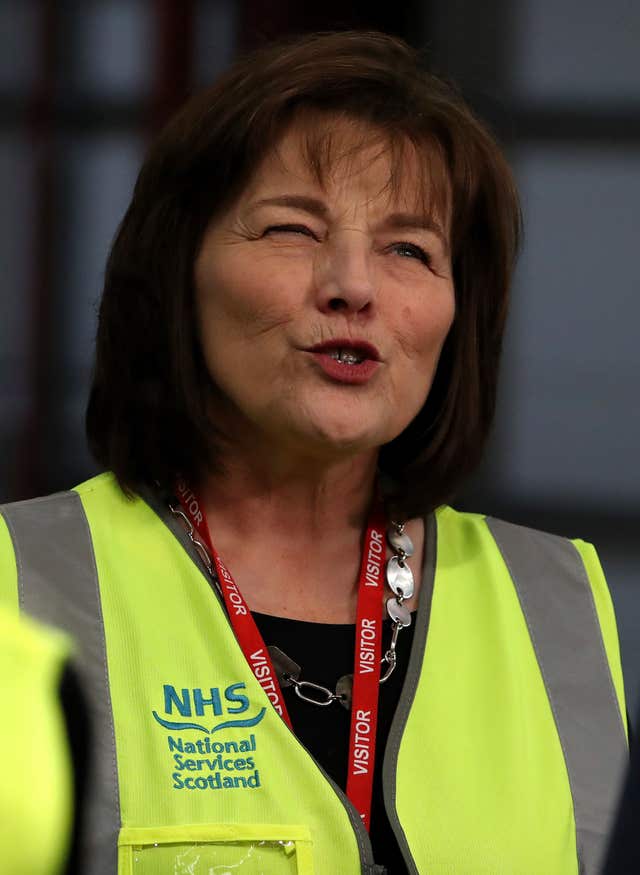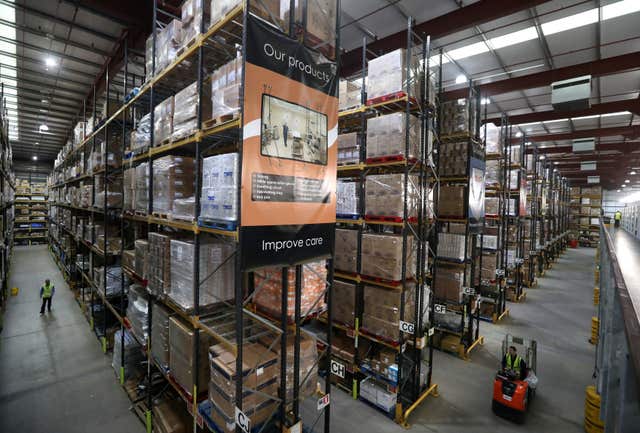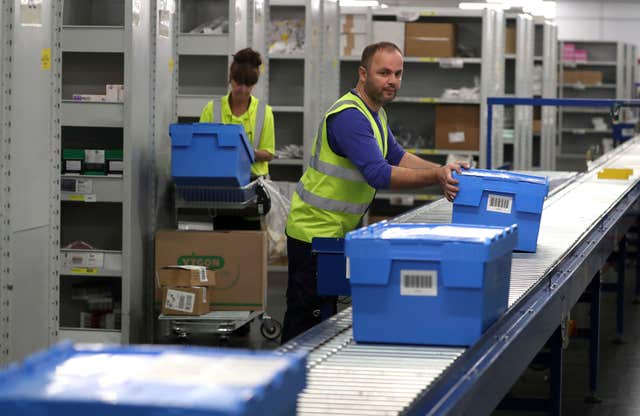
Health Secretary Jeane Freeman has urged people not to individually stockpile drugs ahead of Brexit as she said Scotland’s NHS is “as prepared as it can be” for the impact of leaving the EU.
The UK Government’s Operation Yellowhammer document warns of shortages of medicine and medical supplies in the event of a no-deal Brexit.
On a visit to NHS Scotland’s national distribution centre, where supplies have been stockpiled, Ms Freeman said preparations are “well advanced” and people who rely on drugs or medical equipment should be “reassured”.
READ MORE: EU agree to Brexit extension as October 31st deadline looks set to be missed
 Health Secretary Jeane Freeman said she is reassured ‘that we are doing everything we can’ (Andrew Milligan/PA)
Health Secretary Jeane Freeman said she is reassured ‘that we are doing everything we can’ (Andrew Milligan/PA)
She was shown round the centre by Jim Miller, NHS National Services Scotland procurement director, who said up to eight weeks’ extra supply of some medical products has been stockpiled, costing around £5 million.
The centre holds around 9,500 items for use in the NHS, such as IV fluids, medical gloves, bandages, swabs and oxygen tubes.
Ms Freeman said: “I’ve got up to date with how we have got increased stocks, the basis on which they decide which stocks to increase and by how much and generally just seeing what is an exceptionally efficient operation from our health service.
“You should be reassured that we are doing everything we can.
“I would ask you not to stockpile because I think that creates difficulties down the line and trust the work that we have put in place is doing everything that we can to ensure that you get the medication that you need.”
 The centre holds around 9,500 items for use in the NHS (Andrew Milligan/PA)
The centre holds around 9,500 items for use in the NHS (Andrew Milligan/PA)
Ms Freeman said the Scottish Government and NHS are “working really hard” to ensure there are no shortages, including identifying alternatives if particular brands of medicine become unavailable and setting up triage centres to provide advice to GPs on what to do in the face of any shortages.
If not needed after Brexit the extra stock will still be used, she said, adding: “All we have done is brought forward some of the additional spend that we would be making anyway in order to ensure that we have got enough the stock just now.”
READ MORE: Poll: Voters think violence towards MPs 'worth it' to get their way on Brexit
Ms Freeman accused the UK Government of having a “brass neck” for criticising the Scottish Government’s Brexit preparations.
She said: “Our preparations are well in advance but it is the UK Government that has to ensure that there are adequate channels for the input of medicines and other consumables from the European Union.
“The Scottish Government doesn’t have the powers to do that.
“If we did, I feel much more assured about the overall preparation but in terms of what Scotland can do I am assured that we are doing everything we can to mitigate against the worst effects of leaving the European Union.”
 Workers load boxes with supplies (Andrew Milligan/PA)
Workers load boxes with supplies (Andrew Milligan/PA)
Mr Miller said NHS Scotland’s centralised procurement has provided demand data to enable Brexit planning.
He said “I think we are as prepared as we can be.
“Where we believe there’s any disruption to our supply chain, whether that’s bad weather, whether it’s Brexit or whether it’s fuel prices recently, we look at those items that are used the most often and adjust the stock levels accordingly.
“We tend to replenish our stock around 13 times a year – about once every four weeks and in preparation for this potential disruption to supply chain we’ve increased that by around four to eight weeks of some of those products that are used absolutely the most regularly.
“I can say with confidence today that whilst we have upped or stocks, those stocks will be used as part of our day-to-day business, regardless of whether Brexit happens this month or next year, regardless of whether it is a bad winter.”



Why are you making commenting on The Herald only available to subscribers?
It should have been a safe space for informed debate, somewhere for readers to discuss issues around the biggest stories of the day, but all too often the below the line comments on most websites have become bogged down by off-topic discussions and abuse.
heraldscotland.com is tackling this problem by allowing only subscribers to comment.
We are doing this to improve the experience for our loyal readers and we believe it will reduce the ability of trolls and troublemakers, who occasionally find their way onto our site, to abuse our journalists and readers. We also hope it will help the comments section fulfil its promise as a part of Scotland's conversation with itself.
We are lucky at The Herald. We are read by an informed, educated readership who can add their knowledge and insights to our stories.
That is invaluable.
We are making the subscriber-only change to support our valued readers, who tell us they don't want the site cluttered up with irrelevant comments, untruths and abuse.
In the past, the journalist’s job was to collect and distribute information to the audience. Technology means that readers can shape a discussion. We look forward to hearing from you on heraldscotland.com
Comments & Moderation
Readers’ comments: You are personally liable for the content of any comments you upload to this website, so please act responsibly. We do not pre-moderate or monitor readers’ comments appearing on our websites, but we do post-moderate in response to complaints we receive or otherwise when a potential problem comes to our attention. You can make a complaint by using the ‘report this post’ link . We may then apply our discretion under the user terms to amend or delete comments.
Post moderation is undertaken full-time 9am-6pm on weekdays, and on a part-time basis outwith those hours.
Read the rules hereLast Updated:
Report this comment Cancel